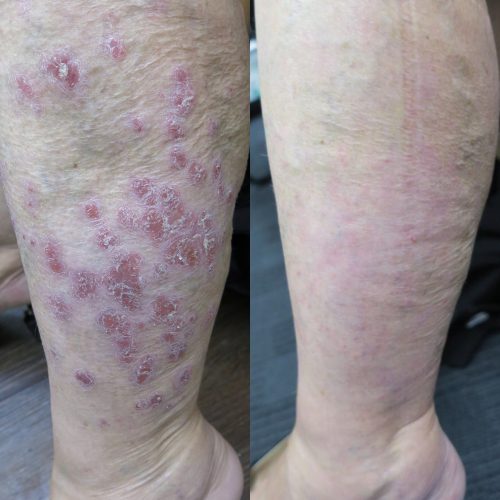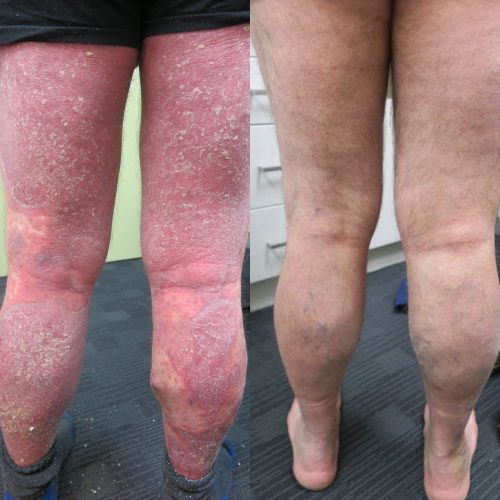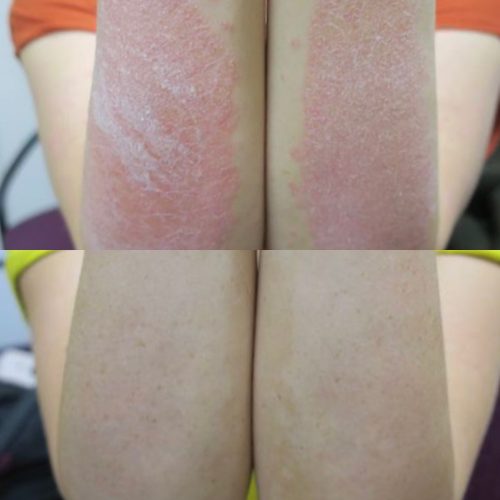How our skin specialists can help with psoriasis
Our consulting dermatologists have extensive experience in the diagnosis and management of Psoriasis. We understand the major impact this condition can have on quality of life and are committed to finding a solution that will control it for you.
If you have Psoriasis, you are not alone; this condition affects 125 million people worldwide – it can affect anyone, at any age and there are several types of Psoriasis.
Although there is no cure for Psoriasis, we have a wide range of effective treatment options available to us and dermatologists are best placed to manage this condition.
At our clinic, Dr Ryan Toholka, Dr Bonnie Swan, Dr Crystal Williams and A/Prof Mahar accept new referrals for Psoriasis.
What is Psoriasis?
Psoriasis is a chronic autoimmune condition, which develops when a part of the immune system becomes overactive and instructs the skin cells to divide and grow at a faster pace. This leads to the skin developing inflamed red raised patches with silver white scales.
Psoriasis commonly affects the skin, scalp nails and joints.
Psoriasis can be associated with arthritis, which can cause painful physical, functional and psychological disability. Early detection is important to reduce complications and delay the onset of severe symptoms.
Being given a formal diagnosis is important. There are other skin conditions that can be mistaken for Psoriasis.
Psoriasis tends to have periods when it flares up and you will experience more symptoms while at other times it may seem to be dormant and hence you will notice fewer symptoms. Unfortunately psoriasis does not go away completely and there is no cure available.
Psoriasis can affect people in different ways. The severity and extent varies from person to person and can fluctuate a lot or just a little over time.
What causes Psoriasis?
We have learned that a person’s immune system and genes play an important role in developing Psoriasis. The genetic inheritance is complex and it seems there are many genes that must interact to cause psoriasis. Psoriasis is not strictly genetic but one third of sufferers have a family member who also has Psoriasis.
It is not caused by poor hygiene, lack of moisturising and it is not contagious – these are common, and often hurtful misconceptions about Psoriasis, but we can help others understand the condition by sharing the facts.
The condition onset usually occurs in people in their early twenties, however there is also a smaller peak onset between 55-60 years of age. Children may also have psoriasis triggered through strep throat or hormonal changes.
Diet is not thought to be a factor, however excessive alcohol consumption and smoking can make your symptoms worse as well as interfering with treatment.
Types of Psoriasis:
Many people think that psoriasis is a single skin condition but there are actually 5 major types of Psoriasis. Knowing more about your type will help you make more informed decision about your treatment methods.
Each type of Psoriasis has very distinct characteristics.
Plaque Psoriasis:
- This is the most common form of psoriasis affecting 80-90% of patients
- Looks like patches of raised round to oval, red skin covered by silvery white scale
- Scalp elbows and knees are common locations.
Guttate Psoriasis:
- Occurs in about 2% of psoriasis patients
- Often appears 2-3 weeks after a cold, especially a Strep throat
- Guttate psoriasis often starts in childhood or young adulthood and presents as small pink dots on the torso, arms, and legs
- Can respond well to ultraviolet light phototherapy.
Inverse Psoriasis:
- Develops in the folds of the skin eg armpits, groin, under the breasts or crease of the buttocks
- The skin looks raw with smooth patches
- Most people with inverse psoriasis will have another type of psoriasis at the same time on another part of the body.
Pustular Psoriasis:
- Mostly found in adults, pustular psoriasis appears as white blisters of noninfectious pus surround by red skin
- Occurs most often on hands and feet.
Nail Psoriasis:
- May affect up to 55 per cent of patients with psoriasis
- Commonly seen in psoriasis patients who also have psoriatic arthritis
- Nails may loosen from the nail bed, crumble, be pitted, thickened and/or discoloured.
Erythrodermic Psoriasis:
- A severe form of psoriasis that affects most of the body with widespread redness of the skin and shedding of scales of the sheets
- Commonly occurs on people who have unstable plaque psoriasis
- It is a rare form of psoriasis affecting approximately 3% of people suffering psoriasis during their lifetime.
Correct diagnosis is key for effective ongoing management.
What triggers Psoriasis?
External factors often flare psoriasis. These include stress, skin injury, sunburn, winter weather, medications, skin infections and hormones.
If your Psoriasis flares it is worth talking to your doctor about a strep throat test, as this often can be a factor even without symptoms. Flare-ups may occur following an earache, bronchitis, tonsillitis or respiratory infections.
There are certain medications associated with triggering Psoriasis, please speak to your healthcare provider for further information.
How can I treat my Psoriasis?
Although there is no cure for Psoriasis, there are many treatment options available to reduce the physical appearance and discomfort of this condition. A dermatologist will get you on an individualised treatment plan to help manage your symptoms effectively.
Everyone’s triggers are different so it helps if you can identify and manage these. Reducing alcohol, stopping smoking, having a healthy diet and getting enough sleep is very important.
Moisturisers help prevent water loss from the skin. Apply a moisturiser immediately after a bath or shower as this may help to reduce dryness in the skin.
Medicated shampoos containing coal tar can be purchased from your pharmacist. Rub the shampoo into your scalp well and leave in for 5-10 minutes, rinse and then reapply.
Other treatment options your can explore with your dermatologist include:
- Topical treatments (creams)
- Narrow band Ultraviolet Therapy (UVB)
- Systemic treatments (oral medications)
- Biologics: These medicines are extremely effective and approved for the treatment of moderate to severe plaque psoriasis that has not responded to topical treatments, light therapy or systemic treatments. Biologics are given by injection under the skin or into a vein. They work by blocking specific pathways within the immune system that are responsible for skin inflammation and excessive skin cell turnover. Medicare has strict criteria that must be met before a dermatologist can prescribe a PBS-funded biological treatment.
Results:
Images published with patient consent. Treatment method vary.



Resources:
For more information about Psoriasis treatment and management, there are wonderful resources available online.
The National Psoriasis Foundation
The Australasian College of Dermatologists: Psoriasis
Skin Health Institute: Psoriasis